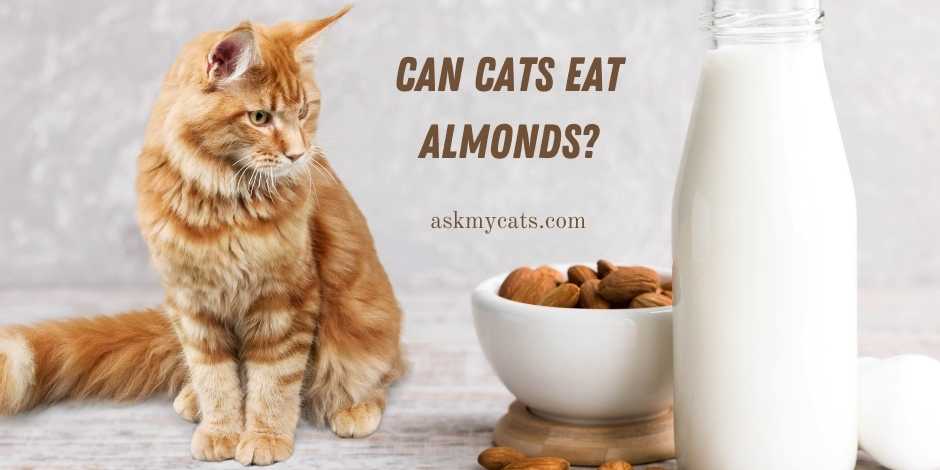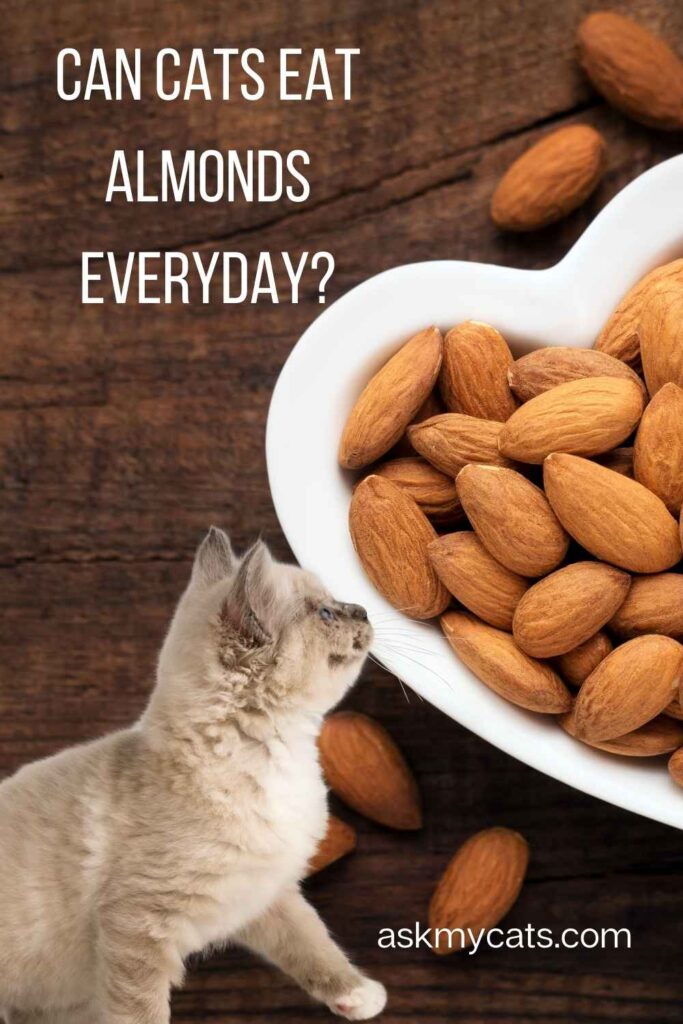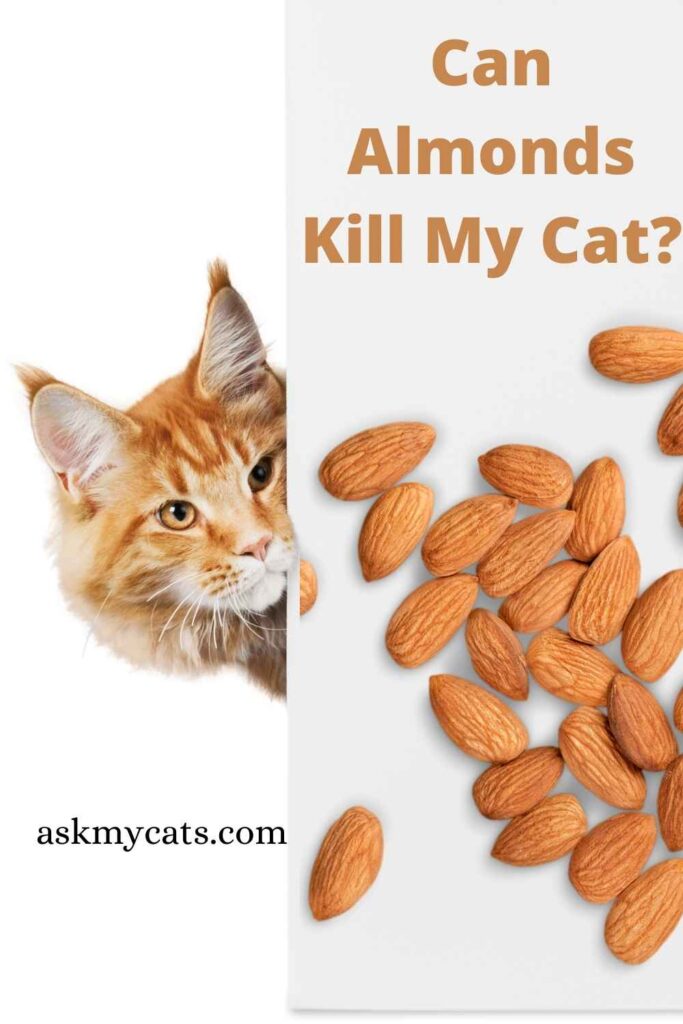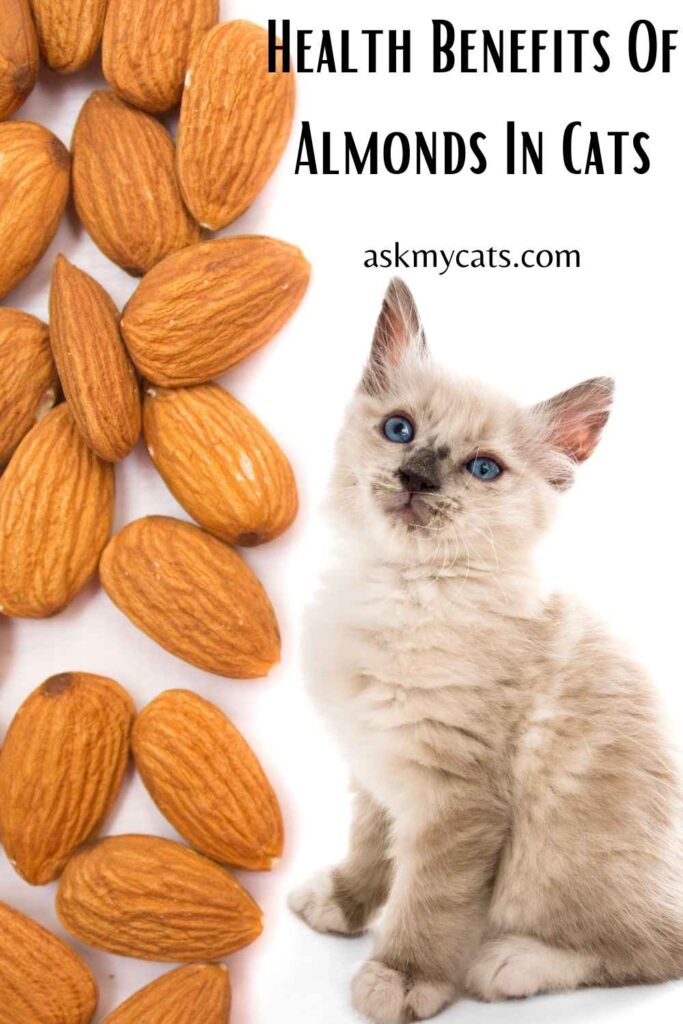One of my favourite snacks is almonds. They’re tasty and packed with vitamins, good fats, and other foods, making them a nutritious snack for humans. They’re not as good for cats.
While almonds aren’t poisonous to cats (though bitter almonds do contain trace amounts of cyanide), they’re not something you should feed your cat on a regular basis.
If you drop an almond on the floor and your cat eats it, you shouldn’t be too concerned, but you shouldn’t offer your cat almonds as a treat. They do produce protein, but not in a form that your cat will consume.
Cats can eat almonds because they aren’t poisoned by almonds, and also add on to much nutritious benefit to his body.
Owing to their short digestive tracts, cats are unable to adequately absorb almonds. Indigestion, dehydration, and potentially diarrhoea are likely to occur if a cat eats more than one or two almonds.


Give Your Cat the Perfect Day
Get the Free Ebook!
Can Cats Eat Almonds Everyday?
Yes, cats can eat almonds according to a routine because sweet almonds are safe for cats to eat in moderation; one or two will not hurt your pet.
Cats are not poisoned by sweet almonds, which are often sold as sweets or cooking ingredients.
If your cat eats an almond or two if you’re not watching, she’ll be perfect, but you shouldn’t let her eat them on a regular basis.
She won’t be able to eat them well and won’t get any dietary value from them, so she won’t be in any danger physically.

Cats who consume a lot of almonds may experience some issues. They’re not toxic, but they’re also not easily digestible.
It won’t be fun for your cat to eat something she can’t stomach. She’ll almost certainly have indigestion at the very least.
She might vomit or have a couple of bouts of diarrhoea at worst. Dehydration is something to prevent in cats if there is a lot of vomiting and diarrhoea.
Please keep in mind that this only applies to sweet almonds.
Have you ever seen a television show where the detective makes a remark on the scent of sour almonds surrounding a body?
I believe this is the source of the widespread belief that all almonds contain cyanide. In fact, the majority of almonds sold for human consumption contain only a trace of the infamous toxin.
Bitter almonds, on the other hand, can be highly poisonous if consumed in large quantities. Amygdalin is a compound found in bitter almonds.
This breaks down into cyanide compounds as ingested. Bitter almonds are normally only available from specialised vendors, so you’re impossible to pick up a package by accident.
Bitter almonds are also consumed as a health food or herbal medicine.
I’m not qualified to speculate on their use as a cure for anything, but I can assure you that even a handful of bitter almonds can be dangerous or fatal.
To kill a person, about ten bitter almonds must be eaten in one sitting.
We can process small amounts of cyanide, but greater amounts are lethal. A lethal dosage for a cat will be much smaller. They are much smaller than we are, and even a single bitter almond will kill them.
Fortunately, this is a remote possibility. The majority of people do not keep bitter almonds in their homes, and those who do will not feed them to their cats.
Are Almonds Poisonous to Cats?
Yes, almonds are a nutritious and convenient snack for humans. While your cat does not become ill as a result of consuming almonds, they can also be harmful to her health.
Cats are not known to be poisonous to almonds. This means that if your cat eats a tiny quantity of almonds or a food that uses almond as one of the ingredients, she would actually be well.
However, the American Society for the Prevention of Cruelty to Animals (ASPCA) advises against feeding almonds to your cat or some other pet because they can cause a variety of other issues.
Cyanogenic glycosides are a poison found in almonds, cherries, peach pits, and apple seeds that is entirely natural. A form of cyanide poisoning can occur if your cat consumes a large volume of cyanogenic glycosides.
If your cat eats so many almonds, she can experience cyanide poisoning symptoms such as dilated eyes, an agitated stomach, or hyperventilation. In the worst-case scenario, the cat will go into shock and could die.
Almonds can cause severe intestinal problems in your cat, even though she doesn’t eat them in big enough amounts to be harmful.
The fats in almonds can upset the digestive systems of cats that eat them, according to the ASPCA. This can result in vomiting or a change in bowel habits. Pancreatitis can grow as a result of high levels of this form of fat consumption.
Salted almonds or almonds wrapped with other toppings, such as chocolate, may be baked to cater to humans. Excess salt ingestion can cause sodium ion toxicosis, which is a disease that affects cats.
When a cat drinks too much salt without drinking enough water, this disease develops. It can be deadly in rare situations. Chocolate is known to be poisonous to cats.
Can Cats Eat Other Nuts?
No, while a sweet almond will certainly not hurt your pet, there are other nuts that are more harmful. Walnuts, in fact, are very harmful to cats.
I think they’re more dangerous to dogs, so if a cat gets into the walnut stash on a daily basis, she can develop an infection of the stomach.
Eating walnuts can even affect animals. A single or two accidentally consumed can only induce a pancreas upset. Her kidneys can fail in serious cases.
I’ve seen macadamia nut warnings, but they’re more dangerous to dogs than to cats. Even then, because eating macadamias provides little advantage to cats, it’s best not to let them try.
Hazelnuts are not believed to cause poisoning in cats, but they are not good for the digestive system like almonds.
Can Almonds Kill My Cat?
No, almonds are generally safe for cats to eat.
Many rumors are based on facts, and this one is no exception. Pets are not poisoned by sweet almonds, the kind marketed in the United States.

However, since they’re not a common part of a pet’s diet, they can cause stomach upset, vomiting, diarrhoea, and potentially pancreatitis if eaten.
Bitter almonds, on the other hand, are poisonous because they contain a cyanide complex.
Bitter almonds are not often available in the United States, although they can be seen in certain natural food markets, where they should be specifically labelled as bitter.
We’re not exactly why nuts get such a bad rep, but pistachios, including sweet almonds, aren’t really poisonous to livestock.
However, if a pet consumes a significant amount of pistachios, it is likely to cause stomach discomfort and potentially pancreatitis—and if pistachios are consumed with their shells on, an intestinal obstruction can occur.
Nuts are the second or rather third, greatest king of micronutrients after vegetables and fruits. Yes, these nuts are among the healthiest foods one can consume. Almonds are the most common of all nuts.
They’re both safe and tasty. Almonds, salted, baked, or mixed with raisins and chocolate, are common among humans. They can also be used in salads and smoothies. Almond flour, almond butter, and almond milk have all gained prominence in recent years.
Simply put, almonds are tasty, and we enjoy eating them because we know how good they are for our bodies and maybe also our spirits (if you are a believer).
Almonds are, without a doubt, beneficial to humans. That is not, though, why you are reading this. You’ve come here to find out whether cats should eat almonds.
If almonds have some advantages for your pet, what are they? Is it okay for your cat to eat almonds or are they poisonous?
Your cat had an interest in those almonds you were eating lately, and before you give in to the lure of feeding them to your cat, make sure it won’t end up in the emergency room of your veterinarian.
There are far too many horror stories you’ve read of people who discovered the hard way that diets that are good for humans aren’t really good for cats. You’ve been more careful, which is a good thing.
What Are The Health Benefits Of Almonds In Cats?
There are a plenty of health benefits of almonds if taken by cats.

1. Full of Vitamins
Although adding almonds to your diet can improve your health, the same cannot be said for cats. Unfortunately, cats lose the most of the nutrients and vitamins found in almonds.
Cats, including tigers, leopards, bobcats, and lions, are obligate carnivores. As a result, meat is the only diet that actually benefits them.
2. Nutrient Content
Being a carnivorous species is more than just a taste for flesh; it’s a biological need. Cats are programmed to live by extracting protein from their prey’s muscle, tissues, and blood.
Felines have lost their capacity to draw protein from plant foods after millions of years of eating beef. The majority of amino acids that the human digestive system can synthesise are unavailable to cats.
Furthermore, they must obtain vitamin A in its preformed form in order to profit from it because they lack the requisite ‘tools’ to produce it from beta-carotene.
3. Good for Digestive System
The digestive system of your cat reflects the kind of food he or she likes. Since the system is short, the body does not have enough time to digest the diverse nutrient types found in almonds.
Since cats are unable to absorb nutrients from almonds, your cat would derive very little benefit from eating them.
In the other hand, there are a few disadvantages of feeding almonds to your pet on a daily basis. Cyanide overdose is at the top of the list of concerns to be concerned with.
You know how effective and fast-acting cyanide is as a killing agent from the few or more spy movies you’ve seen. The victim is dead within a few minutes after ingesting it.
There isn’t a lot of time to administer first aid. Do you want your pet to be in this situation? Certainly not!
The natural poison cyanogenic glycosides are used in almonds. Apple seeds, peach pits, and cherries all contain this poison.
The poison is virtually harmless at low concentrations. However, if eaten in large quantities, the pet can become cyanide poisoned.
If you eat so many almonds, this will happen. Stomach upsets, dilated eyes, and rapid breathing are all symptoms of cyanide poisoning. Your pet can also go into shock and die in some situations.
4. Stomach Upsets
When I clarify this, please keep in mind that not all cats are affected. Nonetheless, anytime you offer your cat almonds, you should keep a close eye on it.
Apart from the stomach disturbance caused by cyanide poisoning, it may also be due to the fats found in almonds. Plant fat differs from animal fat in structure, and your cat can have difficulty digesting it.
Vomiting and diarrhoea are the body’s normal responses to certain health problems. This helps to get the drug out of your cat’s system. Your cat will develop pancreatitis if this does not work and fats accumulate in the body.
5. Almond Toppings and Salt
To tempt humans, almonds are coated in a variety of toppings and salt. Chocolate is one of the toppings available. Your cat can experience sodium ion toxicosis as a result of consuming too much salt.
This disease occurs when the cat consumes a large amount of salt without drinking water. This disorder will lead to death in some circumstances.
It’s important to keep in mind that chocolate is poisonous to cats. If the almonds have chocolate on top, don’t give them to your cat – it won’t end well.
Can Cats Eat Almond Milk?
Almond milk is generally safe for your pet. However, everything can be consumed in moderation.
You’re still curious how almond milk receives the green light while almonds nuts remain in the grey zone.
To begin with, this kind of milk does not contain any dairy products. This means there is no lactose, as most cats seem to be immune to. Almond milk also doesn’t contain any ingredients that are known to be poisonous to cats.
Last but not least, cats adore the flavour. This is undoubtedly a reward that your cat would love.
Keep in mind that almond milk should be consumed in moderation. If you’re applying it to your pet, keep an eye on how it reacts.
Frequently Asked Questions
Can I give almond to my cat?
Nothing in milk, whether cow’s, almond, or soy, is lethal or poisonous to cats, but cats lack the lactase enzyme needed for proper milk digestion. As a result, they get a stomachache. Despite the fact that almond and soy milk do not contain milk, they will affect the appetite of most cats.
What happens if a cat eats almonds?
Almonds can cause severe intestinal problems in your cat, even though she doesn’t eat them in big enough amounts to be harmful. The fats in almonds can upset the digestive systems of cats who eat them, according to the ASPCA. This can result in vomiting or a change in bowel habits.
Final Words
Cats are at their safest when they consume only feline-specific foods. Almonds are a nutritious and convenient snack for humans, but they are not suitable for feline consumption.
While your cat does not become ill as a result of consuming almonds, they can also be harmful to her health.
So please don’t feed almonds to your cat. Do you have any of your questions unanswered? Please post them in the comments section below!

Hey. My cat took a heavily seasoned almond I dropped on the floor. Is this something I should be concerned about?
Almonds are safe for your cat but if it was heavily seasoned, the spices must cause little indigestion.